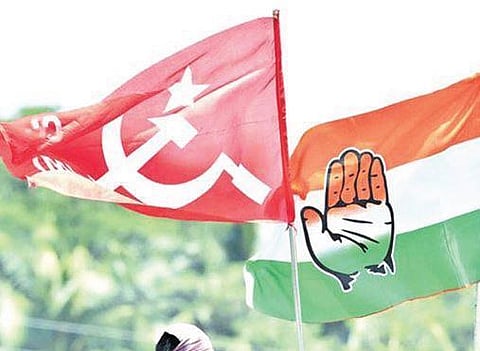

THIRUVANANTHAPURAM: The CPM should distance itself from the Congress on neo-liberal policies and be critical of the latter’s compromising stance on Hindutva communal issues, the CPM leadership has observed. While the INDIA bloc must continue as an Opposition platform, the CPM should simultaneously work out specific tactics and adapt a state-specific approach, said the party’s draft Political Review presented before its three-day central committee meet.
Noticeably, post Sitaram Yechury, the CPM has taken a guarded approach towards furthering any ties with the Congress. In a marked difference from the Yechury line, the draft leans more towards the Kerala CPM-backed Prakash Karat line that insists on keeping the Congress at bay. With Karat being the politburo coordinator, the draft has chosen to toe a more hardline approach.
“The INDIA bloc, as a loose platform that seeks to gather secular Opposition parties, mainly for uniting and pooling anti-BJP votes, should continue. Its main focus of work will be Parliament and periodical elections,” the report said. However, the CPM cannot be part of any broad alliance in both Kerala and West Bengal, said the document.
The party also warns against the INDIA bloc occupying the Left space. “We should counter any tendency to substitute the independent role and activities of the Party with the INDIA bloc. We must also be clear about the class character of the main party in the INDIA bloc — the Congress,” said the draft.
The document further observed: “Demarcate from Congress on neo-liberal policies that they advocate in their national economic policies and when it compromises on Hindutva communal issues.”
The CPM felt that though joining hands with the Congress at the national level has helped counter the BJP, it hasn’t helped the CPM per se.
CPM strength waning
Admitting that its independent strength has been on a alarmingly steady decline, the CPM observed that Alathur was the lone seat won by the party on the basis of its independent strength. Terming it paradoxical, the CPM observed that the performance of both the CPM and the Left has been declining continuously. Its vote share has come down to 1.76% from 1.77% in 2019. Of the four seats it got, three were won with the support of allies.
“The party’s independent strength cannot be measured only in terms of the votes polled and seats won, but they are an indication of our influence and mass base,” it said.
In Kerala, though to a lesser extent in comparison to national figures, the BJP has been able to make some headway, as seen in the recent Lok Sabha polls. The party observed that the BJP-RSS combine had advanced at the CPM’s expense.
KEY POINTS
Any blurring of CPM’s distinctive policies and identity will be detrimental to its growth. While associating with regional parties on the electoral front, the party’s independent political positions should be taken to the people. Referring to the DMK government in TN, the party document said, “We should take a position of supporting policies which are in the interest of the people and demarcating from and, if necessary, opposing policies which are anti-working class or against the people’s interests.”
Without projecting socialism in tune with Indian conditions, the CPM cannot establish its identity as a Communist party. “We have to self-critically accept that we have not done so and must rectify this in our future political-tactical line,” it said.
The CPM felt it should study changes in society with a growing middle class amongst all sections. New lifestyle, migration of educated people and the resultant changes in the cultural outlook need to be understood, particularly with regard to the younger generation, so as to adopt an appropriate stand.